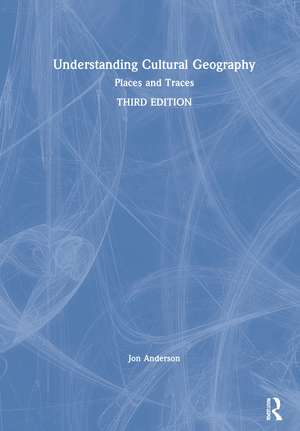Understanding Cultural Geography: Places and Traces
Autor Jon Andersonen Limba Engleză Hardback – 8 apr 2021
The third edition has been fully revised and updated to incorporate recent literature and reflect the changing cultural context of its time. Retaining its exciting and innovative structure, the third edition will expand its focus into new areas, including updated chapters on ethnicity and race, and new chapters on gender and the body. This new edition captures not only recent changes in the cultural world, but also the discipline itself, offering the most up-to-date text to understand and engage with the cultural battlegrounds which constitute our lives.
Understanding Cultural Geography is the ideal text for students being introduced to the discipline through either undergraduate or postgraduate degree courses. The third edition is an important update to a highly successful text that incorporates a vast foundation of knowledge; it is an invaluable book for lecturers and students.
| Toate formatele și edițiile | Preț | Express |
|---|---|---|
| Paperback (1) | 387.31 lei 3-5 săpt. | +34.51 lei 6-12 zile |
| Taylor & Francis – 8 apr 2021 | 387.31 lei 3-5 săpt. | +34.51 lei 6-12 zile |
| Hardback (1) | 768.30 lei 6-8 săpt. | |
| Taylor & Francis – 8 apr 2021 | 768.30 lei 6-8 săpt. |
Preț: 768.30 lei
Preț vechi: 1029.81 lei
-25% Nou
Puncte Express: 1152
Preț estimativ în valută:
147.05€ • 152.94$ • 123.23£
147.05€ • 152.94$ • 123.23£
Carte tipărită la comandă
Livrare economică 13-27 martie
Preluare comenzi: 021 569.72.76
Specificații
ISBN-13: 9780367414931
ISBN-10: 0367414937
Pagini: 280
Ilustrații: 540
Dimensiuni: 210 x 297 mm
Greutate: 0.68 kg
Ediția:3
Editura: Taylor & Francis
Colecția Routledge
Locul publicării:Oxford, United Kingdom
ISBN-10: 0367414937
Pagini: 280
Ilustrații: 540
Dimensiuni: 210 x 297 mm
Greutate: 0.68 kg
Ediția:3
Editura: Taylor & Francis
Colecția Routledge
Locul publicării:Oxford, United Kingdom
Public țintă
UndergraduateCuprins
Part I: Introducing cultural geography 1. Forward! 2. Why cultural geography? Part II: Cultural geography then and now: the history of the discipline 3. The history of cultural geography 4. Branching out: twenty-first-century developments in the family tree of cultural geography Part III: Place and power 5. Knowing (your) places 6. Taking and making places: traces and the stuff of power 7. Senses of place: scales and beliefs Part IV: Money, movement, and the more-than-human 8. The places and traces of capitalism: global, corporate, and anti-capitalisms 9. The places and traces of mobility 10. The places and traces of language 11. The places and traces of nature Part V: Culture and identity 12. The places and traces of the body 13. The places and traces of race and ethnicity 14. The places and traces of gender 15. The places and traces of sexuality 16. The places and traces of youth Part VI: Doing cultural geography 17. Doing cultural geography in practice Part VII: Conclusions 18. A cultural geography approach to places and traces
Notă biografică
Jon Anderson is a Professor of Human Geography in the School of Geography and Planning, Cardiff University, UK. His research interests focus on the relations between identity, culture, and place; in particular the actions, practices, and politics that such relations produce.
Descriere
This book outlines how the theoretical ideas, empirical foci, and methodological techniques of cultural geography make sense of the ‘culture wars’ that define our time. It showcases how this discipline can be used to understand these battles and how we can engage in them.
